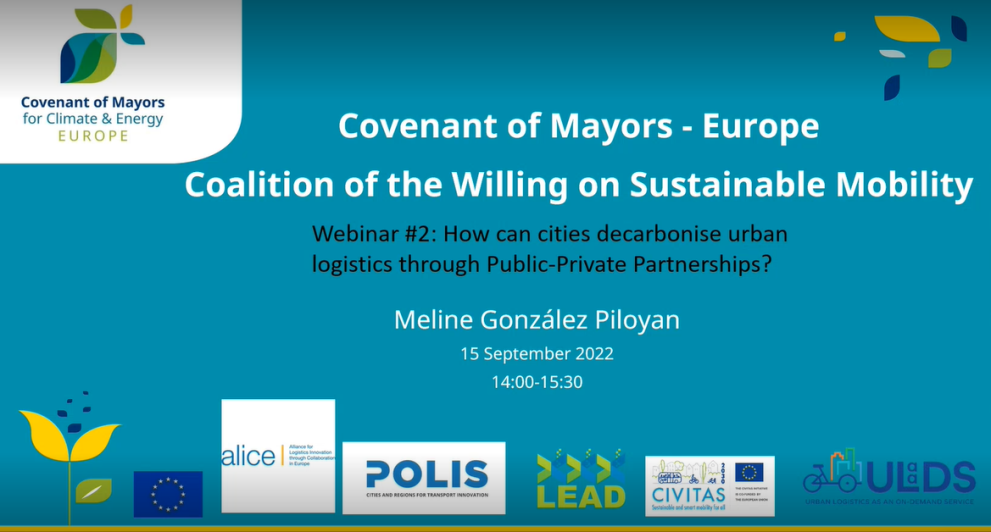
1. Introduction
Logistics plays an essential role in the transport sector, as “every place of activity requires deliveries, collection and servicing”, and brings along challenges such as congestion, air pollution, CO2 emissions, noise, health and safety, resilience, and costs to the companies, and liveability. Establishing cooperation models between local and regional governments and the business sector through constant dialogue and combined planning is key to brainstorming and piloting new models that can decarbonise the sector.
2. Scene setter: (ALICE), Alliance for Logistics Innovation Through Collaboration in Europe & (POLIS), Network of European cities and regions cooperating for innovative transport solutions.
The scene was set by Yanying Li, (ALICE) and Ivo Cré, (POLIS), who presented the Guide for advancing toward zero-emissions urban logistics by 2030, useful to cope with the complexity of decarbonising Urban Logistics. The Guide highlights 5 main areas of intervention, namely: 1) Smart Governance and Regulations, 2) Clean & alternative fleet & energy 3) Logistic operations 4) Purpose-oriented data acquisition and sharing 5) Consumer engagement. Other useful documents shared were a guide to integrate SUMPs and SECAPs (Sustainable Urban Mobility Planning -SUMP- and Sustainable Energy and Climate Action Plans -SECAPs-), a guide to kick start decarbonisation through zero emissions zones, as well as an example of logistics planning (Surf Project).
3. (CULT), Collaborative Urban Logistics and Transport.
The second presentation was that of Alex Vanbreedam (Trivizor), who shed some light on how the CULT framework is “synchronizing” the flow of goods of 13 large companies operating in the city of Antwerp (Belgium). A “project larger than life” (larger than the individual benefits of the actors involved) managed to put together the daily deliveries of competitors including Proximus and Telenet. By reducing the overall distance covered by logistics by 25%, and the emissions produced by 90%, CULT creates benefits for the municipality as a whole through a consolidation effect when delivering goods.
4. (ULaaDS), Urban Logistics as an on-Demand Service, decarbonising last-mile delivery.
By “containerising” goods in one place and using electric cargo bikes, the ULaaDS project implemented in Bremen (Germany) is executing decarbonised last-mile deliveries. Karsten Hülsemann (ULaaDS), described how a Public-Private Partnership funded by the city and by the EU Horizon2020 project ULaaDS is helping the city moving towards more sustainale last-mile deliveries by adding micro-hubs in several locations. The challenge of the project is now that of keeping the emissions from urban logistics low by achieving long-term economic sustainability of the project.
5. (LEAD), Low-Emission Adaptive last mile logistics.
As part of the LEAD project with other 5 cities, Madrid (Spain), is enhancing urban logistics’ decarbonisation through digital twins. Sergio Fernández Balaguer (EMT Madrid) explained how, by setting up an Urban Consolidation Centre within the city centre, and collecting data in an open data repository, the city of Madrid managed to reduce 12% of driving-time for delivery, and emissions by 33%. Data is also accessible to the whole public, becoming relevant for researchers and for further optimisation of the process.
6. Main Takeaways:
· The joint deliveries of goods (consolidation effect) can reduce Km travelled and emissions in the logistics sector.
· It is important to create a distribution framework within the city, where collaborative engagement and governance are key topics to be addressed.
· Open collaborations between public and several private entities can bring overall greater benefits to all stakeholders, but trust needs to be created by engaging stakeholders from the very beginning.
· Acquisition and sharing of data through open data repositories can be useful for companies and municipalities to optimize logistics’ processes.
Watch the recording of our webinar here!
Do you want to follow our next appointments? Dates will soon be available on the Covenant of Mayors’ websites!
Save the date: Active Mobility on 25 November 2022!
Details
- Publication date
- 20 October 2022
